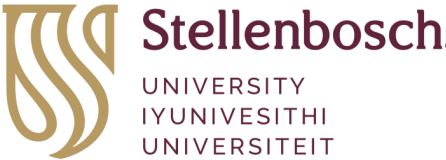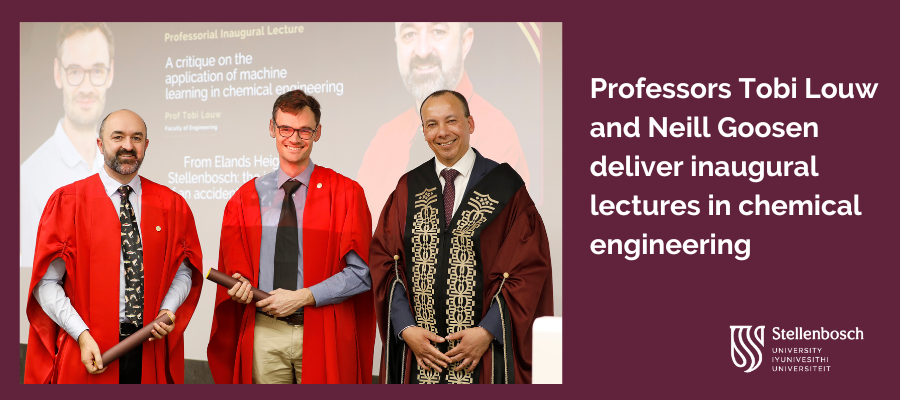
On 19 August 2025, Professors Tobi Louw and Neill Goosen of Stellenbosch University’s Department of Chemical Engineering both delivered their inaugural lectures. Presented on the same evening, the lectures highlighted two distinct fields of research and offered insights into the wide-ranging impact of chemical engineering.
Prof Tobi Louw – A critique on the application of machine learning in chemical engineering
In his lecture, A critique on the application of machine learning in chemical engineering, Prof Tobi Louw reflected on the growing influence of machine learning across industries and its disruptive potential within chemical and minerals processing. While recognising the opportunities these technologies present, he critically examined the challenges that limit their sustainable application. He began by considering the unique characteristics of the industry, before addressing the conflicting ideas and assumptions that cloud decision-making and hinder implementation. He concluded by emphasising academia’s responsibility in enabling innovation through rigorous training and the dissemination of knowledge.
Tobi’s academic journey began at the University of Pretoria, where he completed his undergraduate degree in 2007. He went on to earn a PhD from the University of Nebraska-Lincoln in 2013 for his work on mathematical modelling of ultrasonic bioreactors. After a postdoctoral fellowship at the University of Cape Town, he joined Stellenbosch University in 2015, where he has since played an integral role in both teaching and research.
Throughout his career, Tobi has pursued the simulation of complex and dynamic processes, a path that naturally led him into the field of machine learning. At Stellenbosch, he is part of the Department’s Machine Learning research group, which applies advanced mathematical and statistical methods to process modelling, monitoring, and control. He also leads the Data Analytics for Process Engineers focus area of the structured MEng (Chemical Engineering) programme, ensuring that students are equipped with the latest tools and methods to meet industry needs. Beyond research and teaching, Tobi contributes to strengthening the profession through his leadership as president of the South African Council for Automation and Control (SACAC), where he has facilitated conferences, symposia, and industry-academic collaboration.
Prof Neill Goosen – The journey of becoming an accidental professor
Prof Neill Goosen’s lecture, The journey of becoming an accidental professor, traced his career path and highlighted the research themes that have defined his work. Rooted in a lifelong interest in agriculture and the food system, his research spans from recovering proteins from food processing by-products—such as fish off-cuts and spent brewing grains—back into the food chain, to extracting specialist compounds from seaweeds. He also explored how bioenergy production can unlock value from low-grade biomass, producing both renewable energy and fertiliser. A recurring theme in his lecture was the interconnectedness of systems: food, water, and energy. His research aims to identify synergies across these sectors to make better use of scarce natural resources.
Neill also addressed his work in catalysis research, focusing on optimising reaction conditions and developing new catalysts. His ongoing work investigates ways to produce renewable hydrogen from water using sunlight as an energy source—a field that could transform the global energy landscape. By weaving together his experiences, Neill demonstrated how his career has been shaped less by a straight path and more by following opportunities that link chemical engineering to agriculture and sustainability.
Raised on a farm in the Eastern Cape, Neill matriculated from Hangklip High School in Queenstown (now Komani) before enrolling at Stellenbosch University in 2002. What began as a traditional undergraduate path in chemical engineering quickly evolved when he pursued a master’s degree focused on aquaculture. After gaining experience on a trout farm in Scotland and in engineering design in London, he returned to Stellenbosch to complete his PhD in 2014. He joined the Department of Chemical Engineering as a lecturer in 2013, gradually building a career that now spans academic leadership, international collaboration, and industrial consulting.
Neill’s research continues to combine engineering expertise with agricultural challenges. His work has supported the development of protein and seaweed processing facilities, created biostimulants from fish and seaweed by-products, and even resulted in patents for cannabinoid recovery processes in medical applications. Between 2020 and 2023, he led the ARUA Centre of Excellence in Energy, extending his influence to pan-African collaboration in resource sustainability. With more than 65 journal publications, four patents, and the supervision of 40 postgraduate students, Neill embodies the role of an engineer committed to sustainability, innovation, and practical solutions for the future of food and energy systems.
To watch Professors Tobi Louw’s and Neill Goosen’s inaugural lectures, click here.
Twee professore lewer intreerede in chemiese ingenieurswese
Op 19 Augustus 2025 het professore Tobi Louw en Neill Goosen van die Departement Chemiese Ingenieurswese aan die Universiteit Stellenbosch hul intreerede gelewer. Die twee lesings, wat op dieselfde aand plaasgevind het, het uiteenlopende navorsingsrigtings belig en waardevolle insig gebied in die verreikende invloed van chemiese ingenieurswese.
Prof. Tobi Louw – ’n Kritiese beskouing van die toepassing van masjienleer in chemiese ingenieurswese
In sy intreerede, ’n Kritiese beskouing van die toepassing van masjienleer in chemiese ingenieurswese, het prof. Tobi Louw die groeiende invloed van masjienleer in uiteenlopende bedrywe, asook die ontwrigtende potensiaal daarvan binne chemiese en minerale verwerking, onder die loep geneem. Terwyl hy die geleenthede wat hierdie tegnologieë bied, erken het, het hy ook die uitdagings uitgelig wat die volhoubare toepassing daarvan aan bande lê. Hy het sy lesing begin deur die unieke aard van die bedryf te ondersoek, daarna die botsende idees en aannames bespreek wat besluitneming bemoeilik en implementering vertraag, en afgesluit met die beklemtoning van die akademie se verantwoordelikheid om innovasie te bevorder deur deeglike opleiding en die verspreiding van kennis.
Tobi se akademiese loopbaan het aan die Universiteit van Pretoria begin, waar hy in 2007 sy voorgraadse graad voltooi het. In 2013 het hy aan die Universiteit van Nebraska–Lincoln ’n PhD verwerf vir sy werk oor die wiskundige modellering van ultrasoniese bioreaktore. Ná ’n postdoktorale navorsingsgenootskap aan die Universiteit van Kaapstad het hy in 2015 by die Universiteit Stellenbosch aangesluit, waar hy sedertdien ’n sleutelrol in sowel onderrig as navorsing vervul.
Deur sy loopbaan heen het Tobi hom toegespits op die simulasie van komplekse en dinamiese prosesse – ʼn pad wat hom vanselfsprekend na die veld van masjienleer gelei het. By Stellenbosch is hy deel van die Departement se Masjienleer-navorsingsgroep, wat gevorderde wiskundige en statistiese metodes gebruik vir prosesmodellering, -monitering en -beheer. Hy lei ook die Data-analise vir prosesingenieurs-fokusarea van die gestruktureerde MIng (Chemiese Ingenieurswese) program, wat studente toerus met die nuutste instrumente en metodes om aan die bedryf se groeiende behoeftes te voldoen. Benewens sy navorsing en onderrig, dra Tobi by tot die versterking van die professie deur sy leierskap as president van die Suid-Afrikaanse Raad vir Outomatisering en Beheer (SACAC). In hierdie rol help hy om konferensies, simposia en samewerking tussen die akademie en die bedryf te fasiliteer.
Prof. Neill Goosen – Die toevallige pad na professorskap
In sy intreerede, Die toevallige pad na professorskap, het prof. Neill Goosen teruggekyk op sy loopbaan en die navorsingstemas uitgelig wat dit gevorm het. Sy lewenslange belangstelling in landbou en die voedselsisteem lê ten grondslag van sy werk, wat strek van die herwinning van proteïene uit voedselverwerkingsneweprodukte, soos visreste en gebruikte brouersgraan, vir hergebruik in die voedselketting, tot die onttrekking van gespesialiseerde verbindings uit seewier. Hy het ook ondersoek hoe bio-energieproduksie waarde kan ontsluit uit laegraadse biomassa, deur terselfdertyd hernubare energie én kunsmis te lewer. ’n Deurlopende tema in sy lesing was die verweefdheid van voedsel-, water- en energiesisteme, met navorsing wat daarop gemik is om die sinergieë tussen hierdie sektore te benut en skaars natuurlike hulpbronne meer doeltreffend aan te wend.
Neill het ook sy navorsing in katalise toegelig, waar hy werk aan die verbetering van reaksietoestande en die ontwikkeling van nuwe katalisators. Sy voortgesette navorsing ondersoek hoe hernubare waterstof uit water geproduseer kan word deur sonlig as energiebron te gebruik – ʼn veld wat die wêreld se energielandskap ingrypend kan verander. Deur sy uiteenlopende ervarings saam te bring, het Neill getoon dat sy loopbaan nie ’n reguit pad gevolg het nie, maar gevorm is deur geleenthede wat chemiese ingenieurswese en sy belangstelling in landbou en volhoubaarheid saamsnoer.
Neill, wat op ’n plaas in die Oos-Kaap grootgeword het, het aan Hoërskool Hangklip in Queenstown (nou Komani) gematrikuleer voordat hy in 2002 aan die Universiteit Stellenbosch begin studeer het. Wat as ’n tradisionele voorgraadse kursus in chemiese ingenieurswese begin het, het vinnig ’n nuwe wending gekry toe hy ’n meestersgraad in akwakultuur onderneem het. Ná ervaring op ’n forelplaas in Skotland en by ’n ingenieursontwerpfirma in Londen, het hy na Stellenbosch teruggekeer om sy PhD in 2014 te voltooi. Hy het in 2013 as dosent by die Departement Chemiese Ingenieurswese aangesluit en sedertdien ’n loopbaan opgebou wat akademiese leierskap, internasionale samewerking en nywerheidsadvieswerk insluit.
Neill se navorsing kombineer steeds ingenieurskennis met landbou-uitdagings. Sy werk het bygedra tot die ontwikkeling van proteïen- en seewierverwerkingsaanlegte, die vervaardiging van biostimulante uit vis- en seewierreste, en selfs tot patente vir prosesse wat kannabinoïde in mediese toepassings herwin. Tussen 2020 en 2023 het hy die ARUA-sentrum van Uitnemendheid in Energie gelei, waarmee sy invloed na pan-Afrikaanse samewerking oor hulpbronvolhoubaarheid uitgebrei is. Met meer as 65 vaktydartikels, vier patente en die begeleiding van 40 nagraadse studente, beliggaam Neill die rol van ’n ingenieur wat toegewy is aan volhoubaarheid, innovasie en praktiese oplossings vir die toekoms van voedsel- en energiesisteme.
Klik hier om professore Tobi Louw en Neill Goosen se intreerede te kyk.
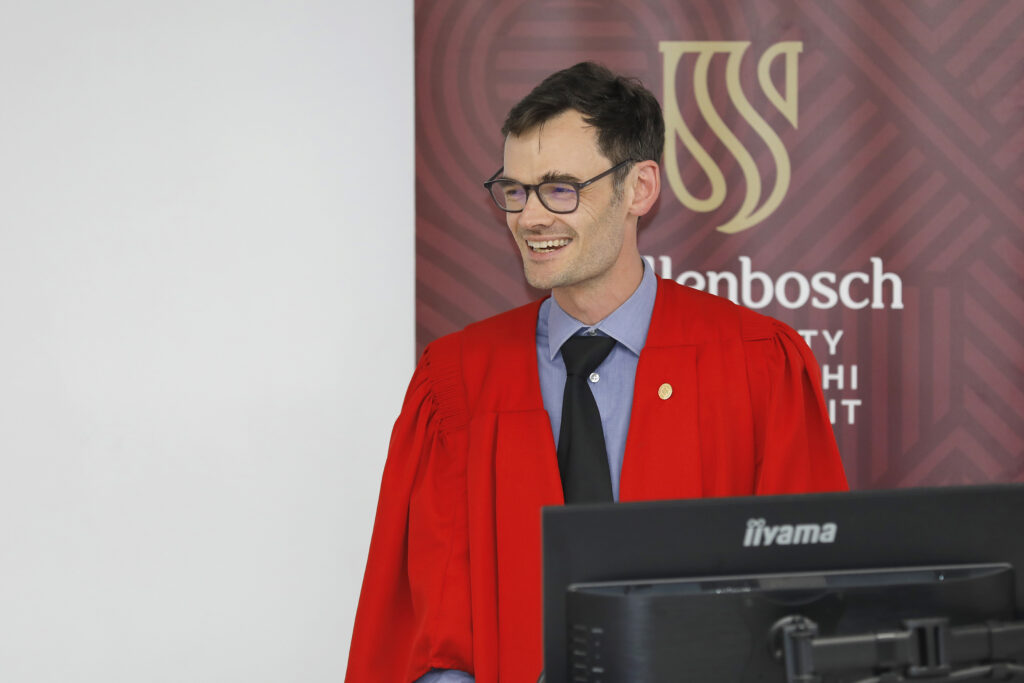
Prof Tobi Louw delivering his inaugural lecture

Prof Richard Stevens (Deputy Vice-Chancellor: Learning and Teaching, Acting); Prof Sibusiso Moyo (Deputy Vice-Chancellor: Research, Innovation and Postgraduate Studies); Prof Tobi Louw (Chemical Engineering); Prof Wikus van Niekerk (Dean: Faculty of Engineering); Dr Ronel Retief (Registrar)
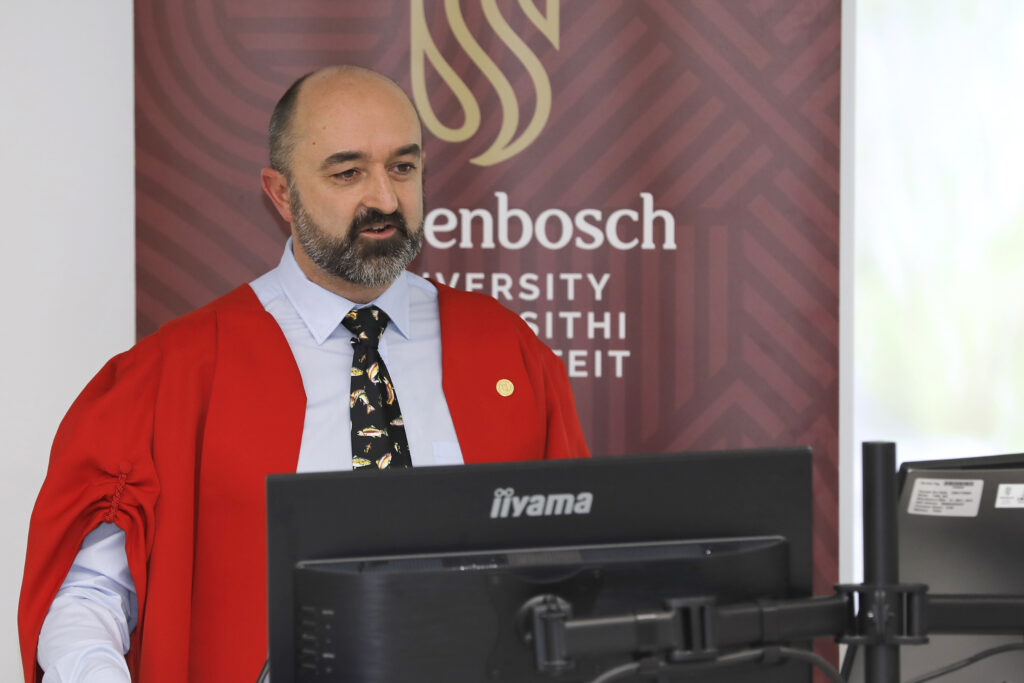
Prof Neill Goosen delivering his inaugural lecture
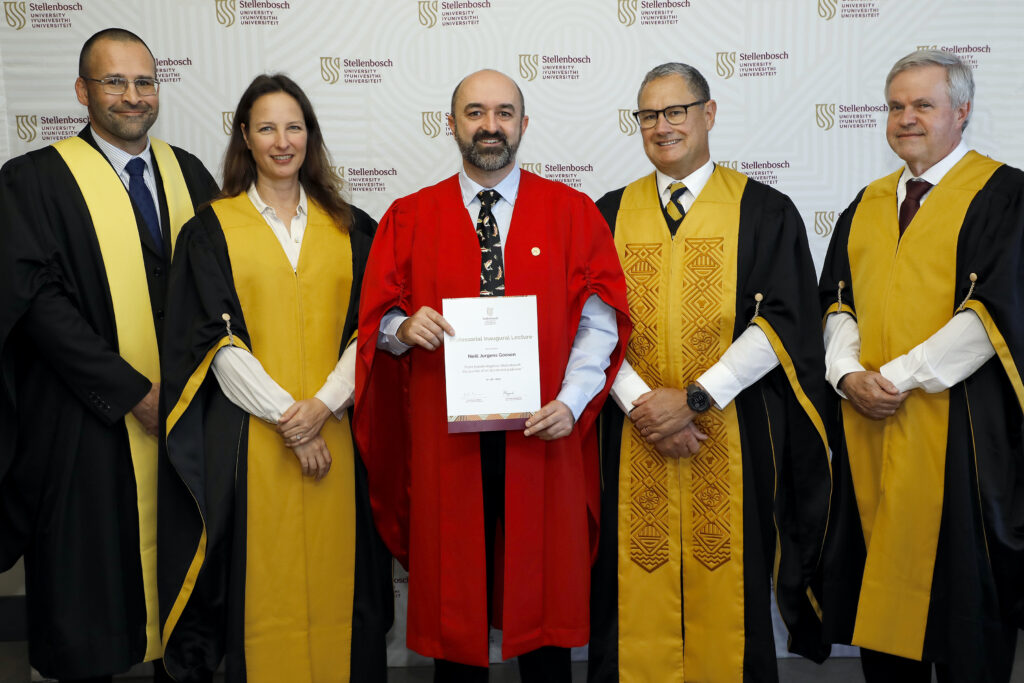
Prof Christie Dorfling (Chair: Department of Chemical Engineering); Prof Celeste Viljoen (Vice-Dean Teaching and Quality Assurance); Prof Neill Goosen (Chemical Engineering); Prof Wikus van Niekerk (Dean: Faculty of Engineering); Prof Corne Schutte (Vice-Dean Research and Industry Liaison)



